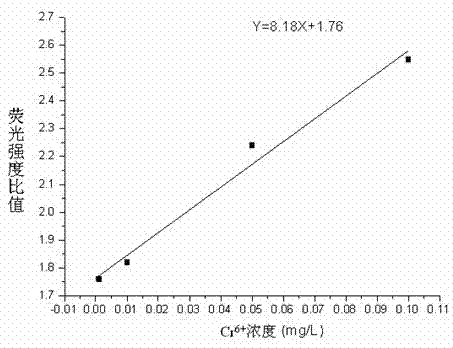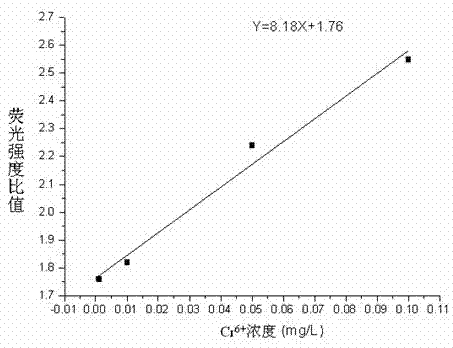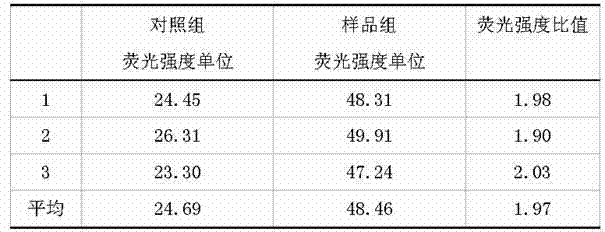Water quality genotoxicity detection method based on semiconductor opening switch (SOS) effect of recombinant Escherichia coli
A technology for recombinant Escherichia coli and Escherichia coli, which is applied in the direction of material excitation analysis, fluorescence/phosphorescence, etc., can solve the problems of high price, insensitivity of chlorinated organic substances, and difficult access to recombinant bacteria system, and achieves simple and easy cultivation and operation , Improve the sensitivity of fluorescence detection and reduce the effect of detecting fluorescence background value
- Summary
- Abstract
- Description
- Claims
- Application Information
AI Technical Summary
Problems solved by technology
Method used
Image
Examples
Embodiment 1
[0042] The application of the genetic toxicity biological detection method based on the SOS effect of recombinant Escherichia coli in the detection of concentrated water samples (4L water concentrated to 1mL) of a water plant, the steps are as follows:
[0043] (1) Recovery and activation of recombinant Escherichia coli storage
[0044] Inject 200 μL of recombinant E. coli stock into 5 mL of modified LB liquid medium (tryptone 10 g / L, yeast extract 2.5 g / L, NaCl 10 g / L). In addition, glucose was added at 0.3% (v / w), ampicillin was added to a final concentration of 50 μg / mL, and cultured at 30°C with shaking at 150 rpm for 16-18 hours.
[0045] (2) Pre-preparation of E. coli detection solution
[0046] Add the resuscitation activation solution into fresh modified LB liquid medium at a volume ratio of 1 / 100, and culture it at 35-37°C with shaking at 180rpm until the OD (520nm) of the bacterial solution is 0.4, about 2 hours.
[0047] (3) Contact with the test sample
[0048] ...
Embodiment 2
[0062] Use the same method to detect the concentrated sample of water plant inflow water in Example 1 (4L water is concentrated to 1mL), and draw the ratio of fluorescence intensity to Cr 6+ Concentration standard curve, using the chromium ion concentration to represent the water quality toxicity of the water sample, the difference is: when resuscitating and activating, the culture temperature is 33°C, and the rotation speed is 180rpm; when preparing the detection solution, the rotation speed is 250rpm, and the cultivation is carried out until the bacterial liquid OD (520nm) 0.3; when the water sample to be tested or the chromium ion solution is in contact with the detection solution, the amount added is 20% of the volume of the detection solution, and the rotation speed is 250rpm. After testing, the fluorescence intensity ratio of the water sample to be tested is 1.90, which is brought into the obtained standard curve, and the genotoxicity of the water sample to be tested is e...
Embodiment 3
[0064] Use the same method to detect the concentrated sample of water plant inflow water in Example 1 (4L water is concentrated to 1mL), and draw the ratio of fluorescence intensity to Cr 6+ Concentration standard curve, using the chromium ion concentration to represent the water quality toxicity of the water sample, the difference is: centrifuge the E. coli contact liquid at a speed of 10,000rpm for 2min, and then break it by ultrasonic method For the bacterial cells, the procedure of crushing for 4 seconds, 4 seconds apart, and 15 times of crushing was adopted, and then the crushed cells were centrifuged at a high speed of 14000 rpm for 8 minutes. After testing, the fluorescence intensity ratio of the water sample to be tested is 2.08, which is brought into the resulting standard curve, and the genotoxicity of the water sample to be tested is equivalent to 0.0391mg / L of Cr 6+ effect.
PUM
 Login to View More
Login to View More Abstract
Description
Claims
Application Information
 Login to View More
Login to View More - R&D
- Intellectual Property
- Life Sciences
- Materials
- Tech Scout
- Unparalleled Data Quality
- Higher Quality Content
- 60% Fewer Hallucinations
Browse by: Latest US Patents, China's latest patents, Technical Efficacy Thesaurus, Application Domain, Technology Topic, Popular Technical Reports.
© 2025 PatSnap. All rights reserved.Legal|Privacy policy|Modern Slavery Act Transparency Statement|Sitemap|About US| Contact US: help@patsnap.com



